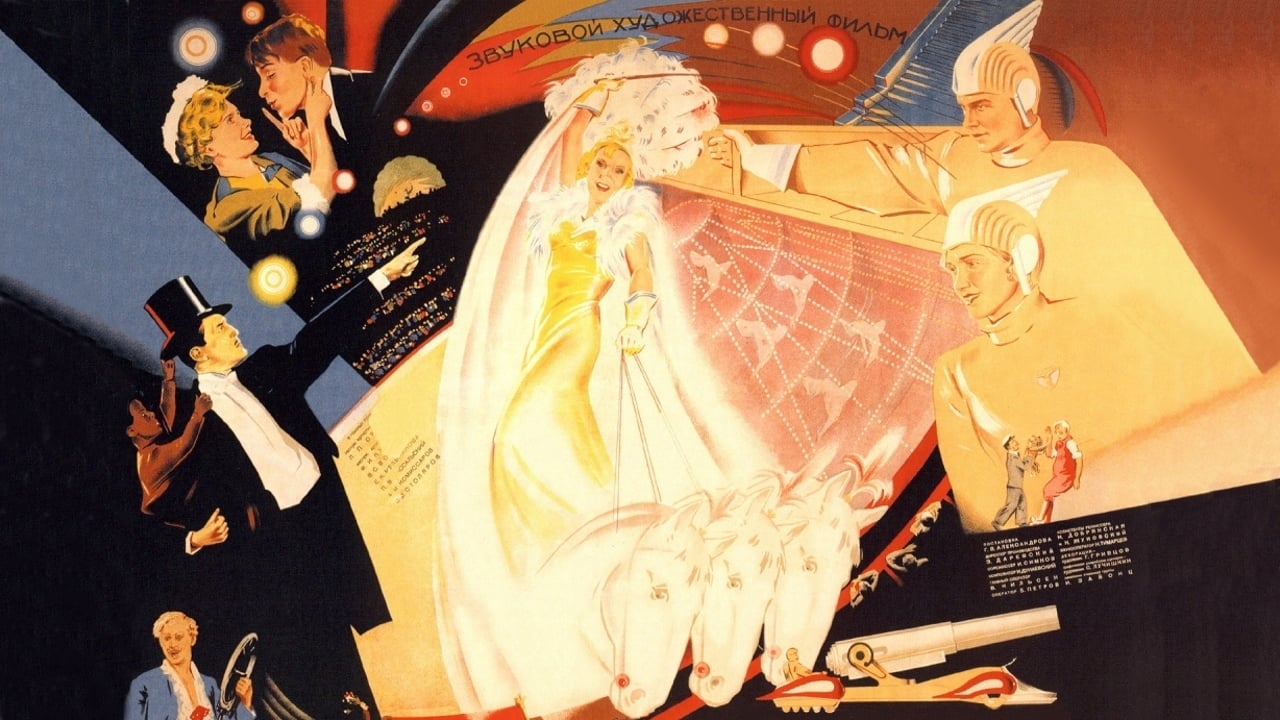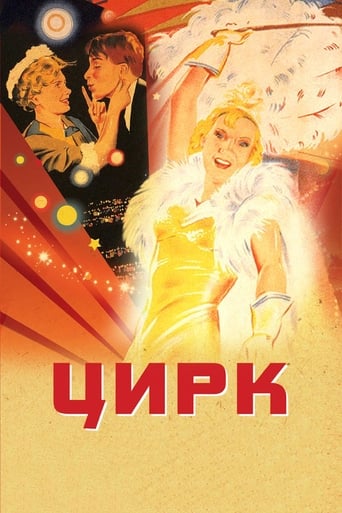

Sadly Over-hyped
... View MoreGood concept, poorly executed.
... View MoreExcellent, smart action film.
... View MoreEasily the biggest piece of Right wing non sense propaganda I ever saw.
... View More"Tsirk", to my mind, is as enjoyable as Mr Charles Chaplin's "The Circus". Unluckily our film did not miss the chance to show off some pressure of Stalin propaganda. The final demonstration and the portrait of you-know-who must have been omitted for the sake of importance and art.The scene with the trio awaiting Rayechka and entertaining the audience at the circus with their repetitive fooling around on the bicycles is one of the funniest sequences ever.The scene with Marion Dixon dancing and singing in Russian with a very peculiar accent is one of the most amazing and exhilarating black-and-white scenes I've ever seen.The scene with the two rivals (Ivan Petrovich Martynov vs. Von Kneishitz) staring each other down and out through a frosting pane is superb and feels very weird and even fearsome.The scene with a close-up of Mary before her dangerous performance is one of the most powerful.The scene with the people chanting a kind of lullaby in different languages to a black child while handing him over to one another is simply outstanding and very tender.The names. I really enjoy the use of names and numerous puns in our old films. Here the name of the main villain is "Kneischitz" (do you get the sound of it?) and one of the silly characters is called "Taburetkin" in one conversation instead of his personal "Skamejkin". As to the way Mary uses "Petrovich"... Nice verbal tricks.The funniest lines: "She was a Negro's lover! And she has a black child!!!" (Von Kneishitz) "So what? Ha-ha-ha!" (Russian audience)I could go on...Verdict: Mrs Lyubov Orlova is one of the finest actresses of the black-and-white era. Her talents are amazing (in singing, acting, dancing, intonations, stunts, good looks, powerful presence, etc.).8 out of 10 (without uneasy exaggeration at certain points and Stalinism it would zoom higher). Thank you for attention.
... View MoreCircus is about an American dancer, who is touring through Moscow as a dancer in the circus. She falls in love with a soldier in Russia. It's discovered that she is the mother of an interracial child, which displeases her manager. She comes under attack from him, but she is ultimately accepted into the loving embrace of the Soviet people.The director of Circus Grigori Aleksandrov had a specific purpose when making this film - to show that the unity of the people could rise above any opposing force. The film serves as a propaganda piece for Russia, Stalin, and socialism. At the end of the film, when our main character is under attack from the villain, everyone in the circus audience quickly comes to her aid and hides the baby from hard. This represents the unity and equality of the Russian people. Everyone is equal and everyone is accepted. The film takes place in the 1930s, in Russia. Most of the action takes place within the walls of the circus. Although, at the end of the film, the whole group of performers and friends march through the streets of Moscow in praise of unity, communism, and Russia. I thought the movie was very interesting and thought provoking. Not only did it contain musical elements, but it also proclaimed an intense social message. I especially liked the story line, because it seemed unique and interesting - how many movies about American dancers in the Russian circus are there?I would definitely recommend this film to a friend because of the unique story, the 30s-era musical numbers, and the interesting social message. Not many movies usually spell out their message in such a way as Circus did. Imagine if every movie with an important social message had its characters run through the streets at the end, proclaiming the lesson learned!It's interesting to see a moment in time, in a country where the people are so passionate about unity. You know things were not this perfect in real life, but its fun to see a glossed over version of history - if only to recognize its weirdness.
... View MoreThe movie Tsirk is about a Russian woman named Mary who was a socially out casted for having a black child. During her escape she is meets her soon to be German manager Von Kneishitz. After running away from her previous life with her new born baby, she joins the circus. In this new group she is at least making a living but she still feels like she must hide from her past. Her manager, Von Kneishitz, is always reminding Mary of her situation and frequently threatens to reveal Mary's illegitimate child. As Mary becomes more at home in her new environment she begins to have feelings for the ideal Russian man. As her feelings continue to grow for the great Russian man the threat to reveal her child becomes more real. While pursuing her new love Mary's plans are thwarted by the conniving and evil German. The film ends in glory after Von Kneishitz reveals Mary's son. All the people under the big top unite to welcome the newly discovered child into the warm embrace of the Russian state. All of this happens while they laugh at the silly German for being racist and turn him into the outcast. This film is brimming with propaganda. This film shows just how great the Russian people are when they unite together to belittle the foolish and backward German. There is also a scene that features a giant poster of Stalin that helps the viewer to see that this work was used as propaganda. While on the one hand it supports Russian unity and demonstrated the evils of the German people it also was racist in its own rite. During one of the final scenes all of the different ethnic groups sing to the child in their own native language. The shot with the Jewish group singing to the child was cut out of the official soviet release. This was an interesting film but I would only recommend it to those interested in seeing how the Russian government was interested in spreading the message of the state through film.
... View MoreWe rented this movie for my Russian grandmother; she's seen it, she says, 17 times. Scary. This is a saccharine romance in which an American actress, impregnated by a black man, escapes to Russia and starts a new life. She loves one man; the heavy, however, threatens that if she doesn't marry him, he will reveal her secret. This continues for a long time until the end, when he does so; indignantly, the masses at the circus rise and say that it doesn't matter what color the baby is, this is tolerant Russia! Then, for no reason whatsoever, the actress and her new lover are marching at the head of a huge parade singing about the freedom that Soviet Russia provides.This is one of those knock-off comedies that Aleksandrov made after returning from Hollywood. It even features a Chaplin impersonator. It's not that great, and anyone who masochistically feels they simply must learn about Soviet film in the 1930s would be advised to stick to Eisenstein and The Three Songs Of Lenin.
... View More